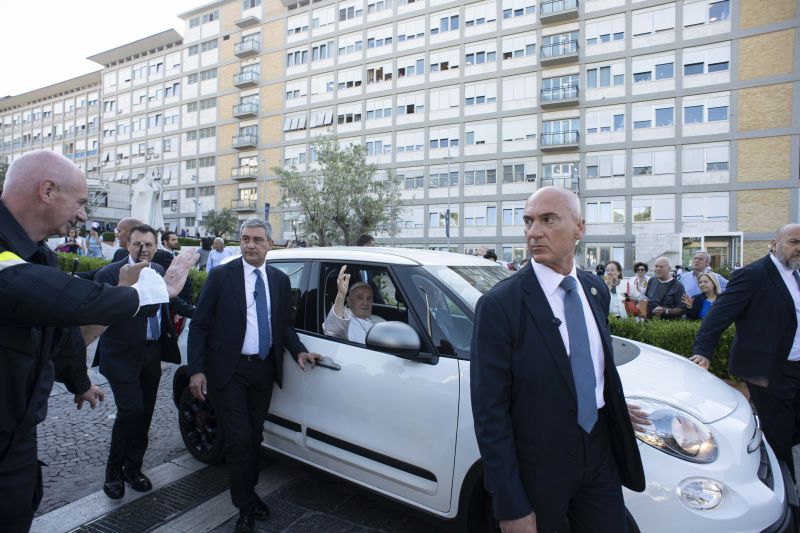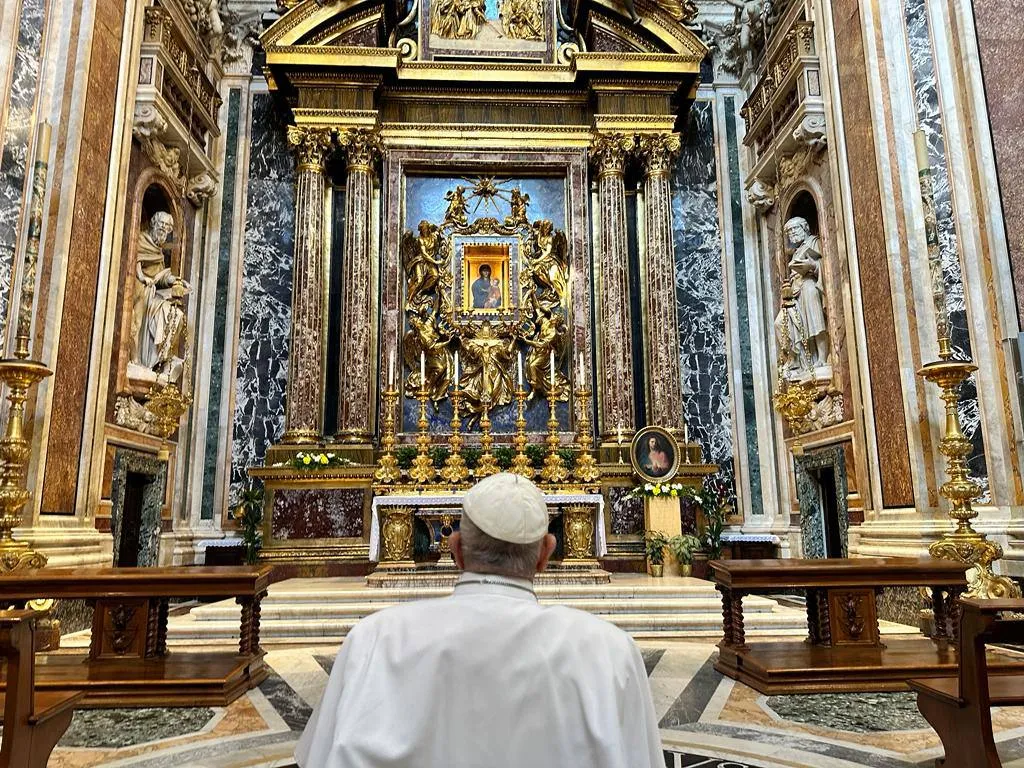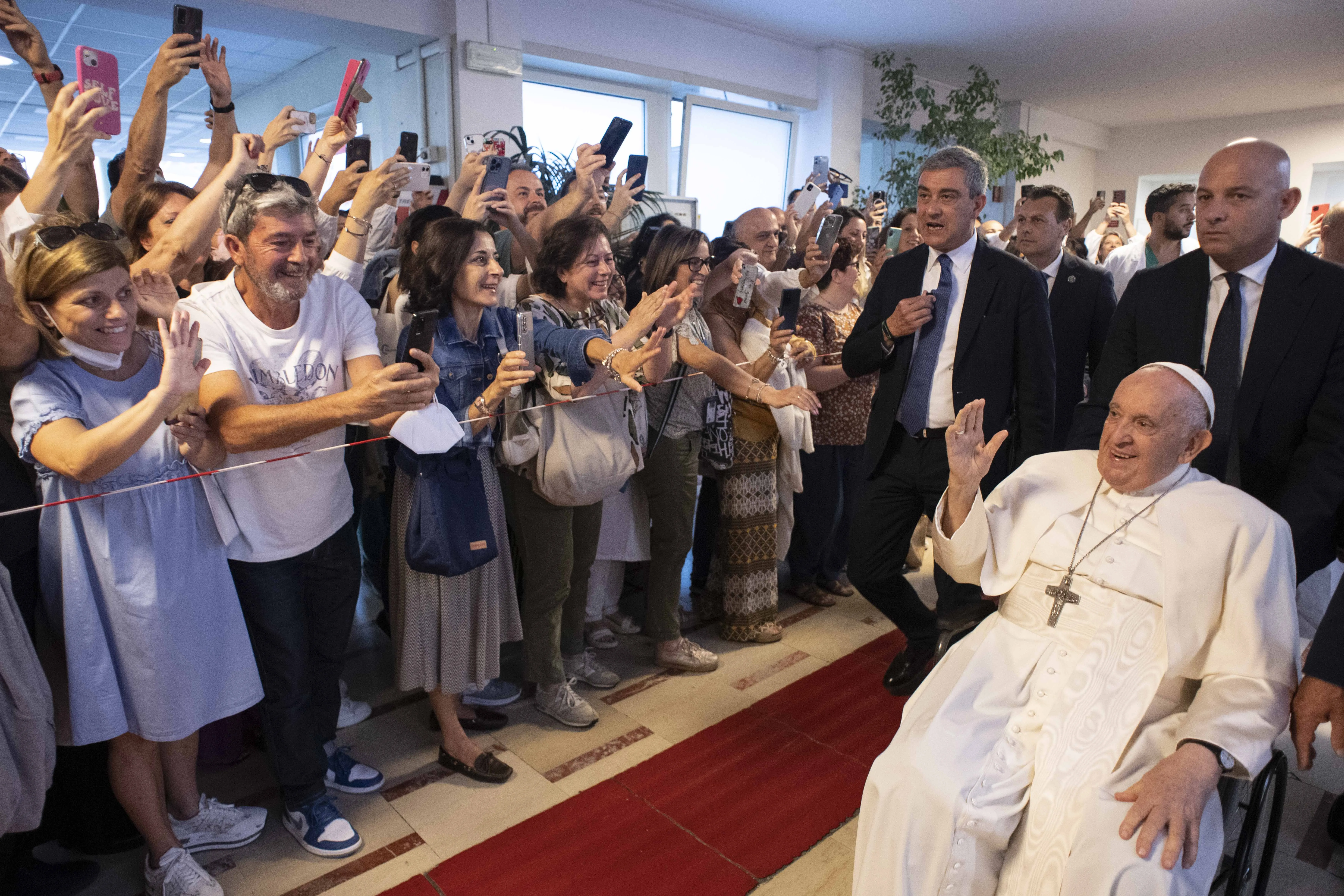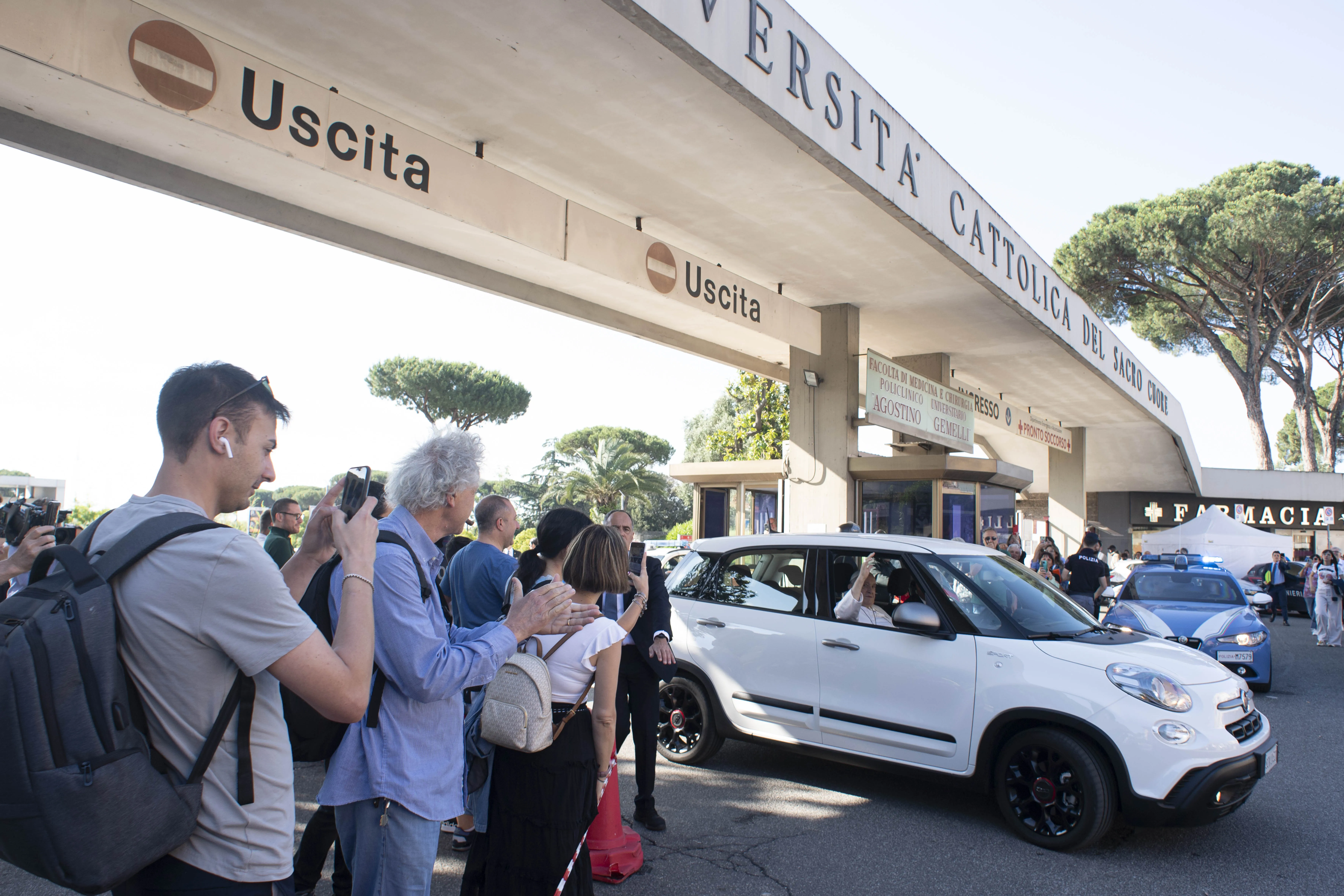
Rome, Italy, Feb 5, 2023 / 11:35 am (CNA).
Pope Emeritus Benedict XVI’s death was used by people in a self-serving way, Pope Francis said aboard the papal plane returning from South Sudan on Sunday.
“I think Benedict’s death was instrumentalized by people who want to serve their own interests,” he said during an in-flight press conference Feb. 5.
People who instrumentalize such a good and holy person, Francis added, are partisans and unethical.
There is a widespread tendency to make political parties out of theological positions, he said. “I leave it alone. These things will fall on their own, or if they don’t fall they will move on as has happened so many times in the history of the Church.”
Pope Francis’ comments were made aboard the papal plane from Juba, South Sudan, to Rome, at the end of a six-day trip that also included nearly four days in the Democratic Republic of Congo.
In a papal first, the in-flight press conference included the participation of the pope’s Anglican counterpart, Archbishop of Canterbury Justin Welby, and the moderator of the Church of Scotland, Iain Greenshields.
Welby and Greenshields had joined Pope Francis in South Sudan for an ecumenical pilgrimage of peace and reconciliation. The two Christian leaders responded to some, but not all, of the questions on the papal flight.
Near the end of the nearly hour-long press conference, Pope Francis was asked if his papal ministry had become more difficult since Benedict’s death in light of growing division in the Church.
Francis reiterated that he was able to speak about everything with Benedict, even to change his own mind.
“He was always by my side, supporting me. And if he had any difficulty he would tell me and we would talk and there was no problem,” the pope said.
He went on to describe a moment in which it appeared that someone may have wanted to pit Francis and the pope emeritus against each other.
Pope Francis recalled once referencing civil solidarity pact, a law in France that allows nontraditional civil unions between two people to receive certain benefits without all of the rights and responsibilities of civil marriage. Francis had suggested this type of partnership as a possible solution for homosexual couples for the purpose of “securing property.”
After Pope Francis had made these comments, “a person who thinks he is a great theologian, through a friend of Pope Benedict, went to him and made a complaint against me,” the pope said.
Benedict’s response was not to be “shocked,” the pope added, but to call together “four top theological cardinals” to explain the concept to him.
“And that’s how the story ended,” he said. “[This was] an anecdote to see how Benedict moved when there were complaints.”
Benedict XVI, he emphasized, “was not a bitter man.”
Pope Francis visited the Democratic Republic of Congo and South Sudan Jan. 31-Feb. 5. Over the six days, he had moving meetings with local leaders, Catholics, and victims of war and conflict.
If you value the news and views Catholic World Report provides, please consider donating to support our efforts. Your contribution will help us continue to make CWR available to all readers worldwide for free, without a subscription. Thank you for your generosity!
Click here for more information on donating to CWR. Click here to sign up for our newsletter.









See? The pope is dialoguing here.
Looking forward. Not rigid or regressive at all.
“A person who thinks he is a great theologian.” This description given by the Pope best portrays a lot of the frequent bashers and slanderers against Pope Francis. With the little theological study they made they think they are superior than the Pope and by through their social and mass media magisterium frequently judge him as not properly teaching the faith, or worse a heretic. They really think they are more Catholic than the Pope. Indeed, a little theological knowledge is dangerous!
Dear James:
A simple man using scripture as his guide can level effective and competent counter-arguments to anyone who is presenting a different doctrine to what Jesus Christ gave to mankind! The most important component is the indwelling of the Holy Spirt. That is what truly changes a man and allows him to confess Jesus Christ as Lord.
James 1:17 Every good gift and every perfect gift is from above, coming down from the Father of lights, with whom there is no variation or shadow due to change.
Hebrews 6:18 So that by two unchangeable things, in which it is impossible for God to lie, we who have fled for refuge might have strong encouragement to hold fast to the hope set before us.
Hebrews 6:17 So when God desired to show more convincingly to the heirs of the promise the unchangeable character of his purpose, he guaranteed it with an oath,
1 Timothy 1:17 To the King of the ages, immortal, invisible, the only God, be honour and glory forever and ever. Amen.
2 Timothy 3:16 All Scripture is breathed out by God and profitable for teaching, for reproof, for correction, and for training in righteousness,
1 Timothy 5:20 As for those who persist in sin, rebuke them in the presence of all, so that the rest may stand in fear.
Yours in Christ,
Brian
James, so now you’re invoking the Appeal to Authority Fallacy to defend Bergoglio?
Really?
No one who’s not a priest or theologian has a right to criticize the pope, right? That’s what you’re saying?
I’m sorry, James, but you’re making me laugh. Because Bergoglio is always the first to deride that kind of clericalism.
But never fear. There are at least a dozen other classic logical fallacies you can resort to next time.
LOL!
At the following link there are numerous examples of the character flaws of the Pontiff – who is by his own admission not a Canon lawyer, not a liturgist, not a theologian and who would likely, in my opinion, make a lousy sacristan – who Father Kolvenbach warned should not be ordained a Bishop due to his psychological balance being lacking, that he had a deceitful character and that during his time as Provincial, he had divided Argentina. We’ve had nearly ten years to witness firsthand exactly what kind of person the Bishop of Rome is despite the best efforts of his sycophants to obscure the truth.
The Pope Francis
LittleBumper Book of Insults“We have a very creative vocabulary for insulting Others!” – Pope Francis, 19 June 2016
James, really? Anyone has at their fingertips the Revealed Theology of the Living God, He is their/our Theologian, so they know when they are hearing the Voice of Christ or the voice of a non-Christ – Jesus says this is True, ‘that His Sheep know and follow His Voice’, is He being disputed? Francis has exhorted and called for this from all the People of God as the sensus fidelium/fidei, and now that they are doing so and giving witness with the Holy Spirit, against things that are not part of God’s Divine Revelation and Gospel, God in them and they in God, they are in the wrong? This same exhortation of sensus fidelium/fidei Francis as given for the breath and substance of the synods… Also God the Theologian and other theologians in the Church have testified to the Truth of the Gospel and where this unity and expression and how it is absent in francis or those who write or speak for him…. Blessings, Father
here is an example of ‘problems’:
Christ/Holy Spirit, the Theologian: “go and sin no more”, francis the theologian, “go and continue to sin”; Christ: ‘it is not a marriage’, ‘it is not God’s Will’, ‘it is not a grace’; Francis/his writers: ‘it is a marriage’, ‘it is God’s Will’, ‘it is a grace’; Christ/ Holy Spirit [and in Saint John Paul just for one]- ‘go and sin no more living chastely continent as brother and sister for the sake of the children’, Francis: ‘go and continue the adulterous sins for the sake of the children in NOT living in chaste continence’; Christ: ‘repent and in a Holy Confession intend to go and sin no more or no absolution (John 20:23b)’, Francis, ‘do not repent and in Confession do not intend to go and continue sinning, as you must and will receive absolution, it cannot be withheld’.
“Shut Up! Catholics!” “Welby and Greenshields had joined Pope Francis in South Sudan for an ecumenical pilgrimage of peace and reconciliation.”
I am always amazed at how Pope Francis can spew out the hate and disrespect for Catholics who see things differently than himself, while he pours on the sugar coated ecumenical honey to the Protestants who have already left the Church. Does Pope Francis want Catholics he despises to leave the Church so he can finally be nice to them as Protestants?
Yes, yes, but the entangling factor in these deteriorating times, at least in the United States, was that “civil unions” were first advocated as an alternative to possible “gay marriage.” With the assurance (!) that this specific accommodation was not a Fabian half-way house toward a later demand for marriage parity (parody?). A lie…
Not that the limited purpose of “securing property” is illicit, but as a general question: what might “four top theological cardinals” have to say about the non-theological crisis of wisely navigating our post-modern politics and our post-politics modernity?
Not “bitter” here, nor a theologian, but just noticing that prudential judgment is a real can o’ worms these days. We’re reminded of how basketball players on the baseline can be incrementally maneuvered out of bounds without every being fouled–because they do not plant their feet.
During this return flight another CNA reporter added the following in reference to a previous controversy that ‘homosexual sins are not criminal acts’, “According to the Catechism of the Catholic Church, people with homosexual tendencies should be treated with respect, and unjust discrimination against them should be avoided, while ‘homosexual acts are intrinsically disordered,’ and ‘under no circumstances can they be approved’” (Pope Francis return flight Rome CNA Courtney Mares 2.5.23).
CNA had the pontiff well covered apparently nothing missed. Although, previous to the flight and this strong affirmation of a moral doctrine – in his speedy response to Fr James Martin’s concern over the sin v criminality issue Francis then said the same, that homosexual acts are sinful. Nonetheless, he made sure to add [straight out of his Amoris Laetitia playbook] that mitigating circumstances could alleviate responsibility even remove it.
Whether the Catechism’s treatment of self abuse 2352 and mitigation provide just reasons that may absolve a gravely sinful act such as sodomy [even the issue of habitual masturbation is not clearly, likewise sufficiently treated in that section] – is not evident.
We cannot disassemble the moral doctrines of the Church on a conceptual theory of circumstantial mitigation. His previous statement does this with the assumption that as treated in Amoris conscience rules rather than the rule. The end result is that people who seek a rationale for their behavior run with this.
I’m done with these in-flight pressers. I’ll look to Catholic Unscripted and Anglican Unscripted for intelligent commentary.
Gilberta, special blessings for sharing these 2 apostolates…. Padre
Silence from CNA re: the pope’s comments on same-sex civil unions and anti-LGBQT laws. Not surprising. They must working overtime to figure out a way to popesplain.
Have to wonder who’s the pot and who’s the kettle in this story. Who’s using BXVI’s death now for “partisan” purposes? Sounds like the classic protesting too much. What a sad and petty display for the putative Vicar of Christ.
I’m suffering from Francis fatigue and ignore anything he says that does not come in the form of an “ex cathedra” written statement on matters of faith and morals that conveys the full weight of infallibility. Everything else is pure political posturing.
If someone did indeed go to Fr. Benedict, then Pope Francis is acknowledging that it happened yet naming the person “partisan”.
Pope Francis hasn’t said who are the “4 top theologians” involved; but again, he offers himself witness to the facts. A dialogue with the devil would be the same!
It could be there is more going on than “1 partisan” and “4 top theologians”? Somehow this all got opened up in public after Fr. Benedict’s passing?
In regular law, anyone can make gifts and settlements. Criminal compacts get voided in law when discovered and that is how it should go.
Homosexuality is an abomination that can’t be legalized, it would be bad law. Making “civil unions” law like “homosexual marriage” is still bad law.
Both are scandals. Why is Pope Francis involving himself in scandalizing the natural institutions of marriage and law; and using God and Roman Church for it?
Why does he feel he needs the support of, for example, the Anglicans? France set a bad example in law (and faith) so “therefore” Pope Francis may promote it?
“Partisanship” has no place in the Catholic Church. The Catechism and Tradition join Scripture to see to it. Those who believe in Church teaching are Catholic; those who don’t believe in Church teaching are not Catholic.
Donna, true, many things have no part with Christ and His Spouse. So, who is the partisan?
Bearing false witness is partisanship with satan, Jesus says, so is it a false or true witness that there is a partisan self-serving by some, what are the specifics – where is the evidence? Who are the ‘some’? Is this a false or rash judgement against the 8th Commandment – who has been broadsided by this statement, is their right to good reputation being violated by this?, it’s scandalous to make such accusations without demonstrating it to be such – none of these things are being Christ or a witness to Him and His Teachings?